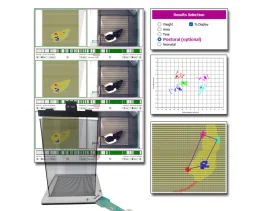Authors
BA Hain, H Xu, AM VanCleave, et al
Lab
Department of Cellular and Molecular Physiology, The Penn State College of Medicine, Hershey, Pennsylvania
Journal
Journal of Applied Physiology
Abstract
Cancer cachexia is a debilitating and lethal consequence of many advanced cancers. REDD1, a negative regulator of mTORC1 activity, is an emerging target in cachexia. Our data show that skeletal muscle REDD1 expression is increased in LLC-induced cancer cachexia. Mice lacking REDD1 have attenuated skeletal muscle atrophy that is likely due to maintaining both protein synthesis and inhibiting protein degradation.
BIOSEB Instruments Used
Grip strength test (BIO-GS3)
Keywords/Topics
Atrophie musculaire; Cancer
Source :

 Douleur - Allodynie/Hyperalgésie Thermique
Douleur - Allodynie/Hyperalgésie Thermique Douleur - Spontanée - Déficit de Posture
Douleur - Spontanée - Déficit de Posture Douleur - Allodynie/Hyperalgésie Mécanique
Douleur - Allodynie/Hyperalgésie Mécanique Apprentissage/Mémoire - Attention - Addiction
Apprentissage/Mémoire - Attention - Addiction Physiologie & Recherche Respiratoire
Physiologie & Recherche Respiratoire




































 Douleur
Douleur Système Nerveux Central (SNC)
Système Nerveux Central (SNC)  Neurodégénérescence
Neurodégénérescence Système sensoriel
Système sensoriel Système moteur
Système moteur Troubles de l'humeur
Troubles de l'humeur Autres pathologies
Autres pathologies Système musculaire
Système musculaire Articulations
Articulations Métabolisme
Métabolisme Thématiques transversales
Thématiques transversales Congrès & Meetings
Congrès & Meetings 